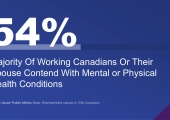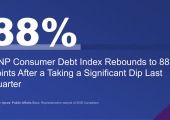Majority of British Columbians (82%) and Ontarians (74%) United in Opposition of Harmonized Sales Tax
Nine in Ten (90%) Believe It's a Tax Grab, Most Say It will be Good for Governments, Bad for Consumers
Toronto, ON - On July 1, 2010, the provincial governments of Ontario and British Columbia are planning to combine their respective provincial sales taxes (PST) with the federal goods and services tax (GST) to create a single, harmonized sales (HST). But according to a new Ipsos Reid poll conducted on behalf of Canwest News Service and Global National, a vast majority of British Columbians (82%) and Ontarians (74%) oppose their provincial government's plans to harmonize the sales tax.
Conversely, just one in ten British Columbians (11%) and Ontarians (12%) support the initiative, while a similar proportion doesn't know (14% Ontario, 7% British Columbia) what to think about the initiative.
It appears that awareness of the government's plan is relatively high with most British Columbians (73%) and Ontarians (65%) indicating that they know at least some things about the proposed HST, while fewer know very little or nothing (35% Ontario, 27% BC).
Based on what they have seen, read or heard about the proposed HST, most think that the big beneficiaries of the HST will be governments as most Ontarians and British Columbians believe that the Provincial Governments of BC (90%) and Ontario (82%) would benefit from the plan, as well as the Federal Government (82% BC, 72% Ontario).
While proponents of the HST argue that the new tax would be beneficial for businesses, a higher proportion believes that the tax won't benefit business (49% BC, 46% Ontario) rather than will benefit them (39% BC and Ontario).
According to those polled, the big losers will be consumers at large, with most saying the new HST will not benefit consumers (91% BC, 84% Ontario) rather than benefit them (4% Ontario, 3% BC). Moreover, only a small proportion (16% BC, 15% Ontario) believes that retailers would pass along to consumers any savings they received from the HST, while most (75% BC, 74% Ontario) believe they wouldn't. One in ten (11% Ontario, 9% BC) are unsure.
Nine in ten (90%) overall are closer to the opinion that `the HST is just a huge tax grab by the provincial government and businesses might not reduce their base prices after implementation and pass the savings onto consumers, tax-included pricing (or "hidden taxation") will occur, and there will be hidden administrative costs for businesses'. On the other hand, one in ten (10%) more closely agree with the sentiment that `while prices for some products and services will rise with the HST, it will make businesses more competitive by lowering their taxes, passing on savings to consumers, creating more jobs and is good for the economy as well as for government revenues'.
Respondents were asked whether knowing a few points about the HST would make them more likely to support it:
- If they knew the HST legislation may include cuts to personal income, small business and corporate taxes, provide house purchase rebates and tax rebate cheques to families, seniors and others to help offset the impact of the HST, and exempt some products like meals under $4, coffee and newspapers, one in three (35% Ontario, 33% BC) would be more likely to support the HST, while nearly one quarter (22% Ontario and BC) would be less likely to support it.
- If they knew that Quebec, New Brunswick, Nova Scotia, and Newfoundland and Labrador have all harmonized their sales taxes with the GST and British Columbia and Ontario will join in moving to a single sales tax on July 1, one in ten (12% Ontario, 11% BC) would be more likely to support the tax, while roughly one quarter (26% BC. 22% Ontario) would be less likely.
When it comes to their spending habits, a majority of British Columbians (72%) and Ontarians (64%) anticipate that the new harmonized tax will affect their day-to-day purchasing decisions - mostly for the worse. Among those who say it will impact their decisions, most (87% BC, 85% Ontario) intend to spend less as a result, while few (2% Ontario, 0% BC) would spend more as a result.
The data reveals that Ontarians and British Columbians believe the HST will be more negative on the economy than the GST has been since introduced in 1993. Over the longer term, a majority (56% BC, 52% Ontario) believes that the HST will have a negative impact on their province's economy over the next five years. Nearly two in ten (18% Ontario, 14% BC) think the impact will be positive, while three in ten (30% Ontario, 29% BC) think it will have no impact over the long run.
By comparison, a minority (45% BC, 44% Ontario) believes the GST, introduced in 1993, has had a negative impact on Canada's economy, while two in ten (21% Ontario, 19% BC) believe its impact has been positive. Almost four in ten (36% BC, 35% Ontario) consider the GST's impact to have had no meaningful impact over the last two decades.
These are some of the findings of an Ipsos Reid poll conducted between November 23 and 30, 2009, on behalf of Canwest News Service and Global National. For this survey, a sample of 1,049 adults from British Columbia and 1,962 from Ontario from Ipsos' Canadian online panel was interviewed online. Weighting was then employed to balance demographics and ensure that the sample's composition reflects that of the adult population in those provinces according to Census data and to provide results intended to approximate the sample universe. A survey with an unweighted probability sample of this size and a 100% response rate would have an estimated margin of error of +/-3.1 percentage points, 19 times out of 20, in B.C. and +/-2.3 percentage points, 19 times out of 20, in Ontario of what the results would have been had the entire population of adults in BC and Ontario been polled. All sample surveys and polls may be subject to other sources of error, including, but not limited to coverage error, and measurement error.
For more information on this news release, please contact:
John Wright
Senior Vice President
Ipsos Reid
Public Affairs
(416) 324-2002
[email protected]
Vice President
Ipsos Reid
Public Affairs
(778) 373-5130
[email protected]
About Ipsos Reid
Ipsos Reid is Canada's market intelligence leader, the country's leading provider of public opinion research, and research partner for loyalty and forecasting and modelling insights. With operations in eight cities, Ipsos Reid employs more than 600 research professionals and support staff in Canada. The company has the biggest network of telephone call centres in the country, as well as the largest pre-recruited household and online panels. Ipsos Reid's marketing research and public affairs practices offer the premier suite of research vehicles in Canada, all of which provide clients with actionable and relevant information. Staffed with seasoned research consultants with extensive industry-specific backgrounds, Ipsos Reid offers syndicated information or custom solutions across key sectors of the Canadian economy, including consumer packaged goods, financial services, automotive, retail, and technology & telecommunications. Ipsos Reid is an Ipsos company, a leading global survey-based market research group.
To learn more, please visit www.ipsos.ca.
About Ipsos
Ipsos is a leading global survey-based market research company, owned and managed by research professionals. Ipsos helps interpret, simulate, and anticipate the needs and responses of consumers, customers, and citizens around the world.
Member companies assess market potential and interpret market trends. They develop and build brands. They help clients build long-term relationships with their customers. They test advertising and study audience responses to various media. They measure public opinion around the globe.
Ipsos member companies offer expertise in advertising, customer loyalty, marketing, media, and public affairs research, as well as forecasting, modeling, and consulting. Ipsos has a full line of custom, syndicated, omnibus, panel, and online research products and services, guided by industry experts and bolstered by advanced analytics and methodologies. The company was founded in 1975 and has been publicly traded since 1999.
In 2008, Ipsos generated global revenues of e979.3 million ($1.34 billion U.S.).
Visit www.ipsos.com to learn more about Ipsos' offerings and capabilities.
More insights about Financial Services


![[WEBINAR] Ipsos Global Trends 2025: Canadian Edition](/sites/default/files/styles/related_more_insights/public/ct/event/2025-08/thumbnail-templates_5.png?itok=hLtbMkre)

![[WEBINAR] Short-Form Social Misfits: Cracking the Code of Creative Excellence](/sites/default/files/styles/related_more_insights/public/ct/event/2025-08/thumbnail_0_10.jpg?itok=-V2lZWdx)